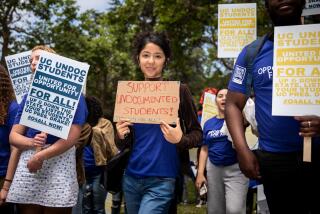Judge Rejects Challenge to Hiring Law : Courts: The failure to get an injunction against Costa Mesa’s dayworker law doesn’t deter civil rights attorneys, who say they will continue to fight the ordinance.
An Orange County judge Tuesday refused to stop enforcement of a controversial provision in Costa Mesa’s dayworker ordinance, marking the second setback in as many months for immigrants rights activists who oppose the city’s attempts to restrict curbside hiring of workers.
Despite the setback, civil rights attorneys vowed to continue their efforts to have the city’s controversial dayworker ordinance declared--in whole or in part--unconstitutional.
“We will consider bringing another action,” said Rebecca Jurado, an attorney with the American Civil Liberties Union. “Our goal is to keep people from being harmed by this” ordinance.
The ACLU, arguing that the ordinance is vague and violates freedoms of speech and assembly guaranteed under the First Amendment, had sought a preliminary injunction to stop police from arresting dayworkers in the three areas of the city specified by the measure.
Part of the ordinance bans people from being in those areas with the “intent” to solicit work. Another provision of the ordinance prohibits curbside soliciting of employment throughout the city but that portion has not been challenged.
The ACLU brought the suit on behalf of David McCoy, a Costa Mesa resident and taxpayer--but not a day laborer--on the grounds that all citizens are harmed when the Constitution is violated.
However, Superior Court Commissioner Ronald L. Bauer said ACLU attorneys failed to show that McCoy is directly affected by the ordinance.
Moreover, Bauer said the city’s efforts to regulate the flow of traffic in areas where dayworkers congregate might be hindered if the injunction was granted.
For the court to grant an injunction would require showing that McCoy is more likely to be harmed by the ordinance than the city is likely to be by not having the ordinance, Bauer said. But ACLU attorneys “have not come close to establishing that McCoy is inconvenienced, threatened or denied his rights,” he added.
Michelle Vadon-Rivera, an attorney with the Los Angeles-based firm of Burke, Williams & Sorensen who represented the city at Tuesday’s hearing, said she was pleased with Bauer’s ruling, adding, “It means a great deal to the city and its handling of problems created by dayworkers.”
City officials and many residents say the ordinance, specifically the portion that prohibits intent to solicit work, is needed because dayworkers who gather on city streets obstruct traffic and harass passers-by. Other measures, including a city-sponsored hiring hall and an ordinance that prohibits workers from approaching cars on public streets, have not solved the problems, they said.
But ACLU attorney Carol Sobel argued that the city had not adequately attempted to enforce the laws it already has before “resorting to the most restrictive means of dealing with the problem.”
“It is easy to solve a problem by removing people,” she said. “But that is not the way we approach problems in our society. There is no evidence the city made a serious effort to enforce” the ban on soliciting employment before adopting the “intent” provision.
Jurado said ACLU attorneys will consider several options in response to Tuesday’s ruling. They may appeal or file a new a complaint on behalf of dayworkers who have been arrested under the ordinance.
To date, police have issued more the 40 citations under the city’s dayworker ordinance, with most of the arrests falling under the general ban on soliciting employment rather than under the intent provision.
Police began making arrests under the intent provision last month after an Orange County Superior Court judge declined to grant the ACLU a temporary restraining order blocking enforcement.
Violations carry a maximum fine of $100 for a first offense and $500 for a second.
Police say the ordinance has successfully cleared the three areas of the city that previously had the heaviest concentrations of day laborers: Lion’s Park, 18th Street and Harbor Boulevard, and Santa Ana Avenue and East 20th Street.
But critics of the ordinance say the workers have merely migrated to other areas of the city or have been driven underground.
“The workers have moved out of the areas but they are also undergoing a lot of economic hardship,” Jurado said.
More to Read
Sign up for Essential California
The most important California stories and recommendations in your inbox every morning.
You may occasionally receive promotional content from the Los Angeles Times.











